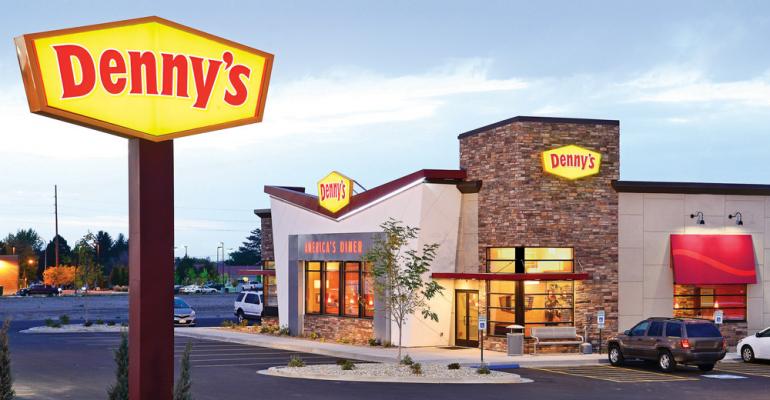Denny’s Corp. has been testing new kitchen equipment to expand its dayparts and emphasize its diner heritage and expects the $65 million investment, which also includes technology, to roll out to the domestic system by the end of 2022, executives said Tuesday.
The Spartanburg, S.C.-based family-dining chain has been testing the new kitchen equipment for more than a year, said John C. Miller, Denny’s CEO, in an analyst call to discuss earnings for the Sept. 29-ended third quarter.
Miller said the “meaningful investments in kitchen equipment and restaurant technology platforms” will advance the brand’s long-term revitalization strategies.
“Investing in this new equipment provides the ability to enhance our menu offerings across all dayparts, but especially further elevating the dinner daypart with new comforting entree, sides and big desserts,” Miller said. “The rollout is expected to begin during the first quarter of 2022, will be substantially completed by the end of 2022.”
The kitchen modernization has been tested in a majority of Denny’s company-owned restaurants and with a group of franchise restaurants, Miller said, and the feedback has been positive.
“We've been on this long journey of revitalization of Denny's as America's Diner and we focused for many years on the breakfast and lunch component,” he said. “The part of preparing for dinner has been the launch of these ovens. But to do dinner items that you don't cook to order, which would be a big change for a normal breakfast or grill cook, you have to have hot holding equipment with that. You have to have different refrigeration on the line. You have to have a training program that supports it.”
Miller said the new equipment package will reduce complexity in the kitchen, improve efficiency and reduce waste.
He cited Denny’s bread program as one area of change. “We have garlic toast and that's it,” he said, “so the ability to have a breakfast or a finished biscuit or dinner roll that would be a capability we have in the future.”
Additionally, Milles said bulk-cooking in the high-tech new oven frees space on the grill. “And when you free up space on the grill, the cook is not waiting or running up and down the line to be as efficient,” he said. “You improve some ticket times, and you also improved some waste.”
Denny’s said it would be aiding franchisees in making the kitchen and technology investments.
“The total domestic franchise system investment for the new cloud-based technology platform and kitchen equipment package is approximately $65 million,” he said. “To assist franchisees, we will be allocating approximately $10 million toward the cost and installation and have also negotiated favorable financing terms on their behalf for the remaining cost.”
Denny’s in the third quarter continued to see impacts from the COVID-19 pandemic, especially the delta variant in the summer, but sales in October of the fourth quarter showed signs of improving, Miller said.
Denny’s systemwide same-store third-quarter sales declined 0.1% compared to the same period of 2019, including a 0.3% decrease at domestic franchised restaurants and a 1.9% increase at company-owned restaurants.
Miller said October saw dine-in transactions reach their highest level since the pandemic was declared in March 2020 and same-store sales once surpassed the 2019 levels.
Earlier this year, Denny’s introduced two delivery-only off-premises brands — The Burger Den and The Melt Down — and sales of those “remained strong,” Miller said.
“During the third quarter, we substantially completed the rollout of our second virtual brand, The Melt Down to approximately half of our domestic system,” he said. “Virtual-brand sales for both The Burger Den and The Melt Down remain highly incremental at approximately 3% of sales. These brands provide opportunities not only at dinner and late-night to leverage underutilized labor, but we continue to see a meaningful number of transactions during the week versus the weekend.”
Robert Verostek, Denny’s chief financial officer, said the availability of labor continued to challenge some units’ return to 24-hour operations. About 45% of Denny’s domestic restaurants are currently open 24/7, he said.
F. Mark Wolfinger, Denny’s president, said about 70% of the domestic system was operating, on average, at least 18 hours per day, a 15 percentage point increase from July.
Miller said about 90 additional Denny’s units had returned to 24/7 hours since July. “We do see momentum in staffing, but we do see this playing out over a few more quarters rather than something happening just overnight in the next few weeks,” he said.
For the third quarter ended Sept. 29, Denny’s net income was $12.3 million, or 19 cents a share, up from $6.5 million, or 10 cents a share, in the same period a year ago. Revenue was up 44.9% to $103.8 million from $71.6 million in the prior-year quarter.
As of Sept. 29, Denny's Corp. owned, franchised and licensed 1,647 restaurants.
Contact Ron Ruggless at [email protected]
Follow him on Twitter: @RonRuggless





